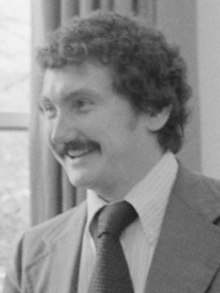Timothy Kraft
Tim Kraft | |
|---|---|
 | |
| White House Director of Political Affairs | |
| In office April 28, 1978 – August 10, 1979 | |
| President | Jimmy Carter |
| Preceded by | Position established |
| Succeeded by | Sarah Weddington |
| White House Appointments Secretary | |
| In office January 20, 1977 – April 28, 1978 | |
| President | Jimmy Carter |
| Preceded by | Warren S. Rustand |
| Succeeded by | Phil Wise |
| Personal details | |
| Born | April 10, 1941 Noblesville, Indiana, U.S. |
| Died | January 21, 2024 Albuquerque, New Mexico |
| Political party | Democratic |
| Spouse | Molly Kraft |
| Education | Dartmouth College (BA) Georgetown University |
Timothy E. Kraft (born April 10, 1941) is a retired
Background
The son of a
Political campaigns
Kraft first worked in a political campaign in
In 1975, he connected once again with Carter in the early stages of 1976 presidential campaign, of which he was the national field director and then the national field coordinator.
Kraft offered
After Carter unseated the non-elected incumbent,
As the national campaign manager, Kraft was like Carter considered skilled in the details of politics; he organized the group known as the "Hispanic American Democrats" to increase the turnout of
In the 1980s, through his company Avanti Ltd., Kraft became heavily involved as a consultant in political campaigns in Latin America, an area in which he had developed rapport while he was in the Peace Corps. In 2003, he appeared in the failed campaign of former
Retirement
In 2004, Kraft lived in Corrales, New Mexico, also the home of former U.S. Senator Fred R. Harris of Oklahoma, another of the 1976 Democratic primary presidential candidates.[2]
As of 2008, Kraft is retired and lives with his wife, Molly, in Las Cruces, New Mexico. In an interview, Kraft said that he misses the excitement of politics and wishes that he could exert a role in ongoing campaigns. He does write occasional columns for the Albuquerque Journal.[1]
References
- ^ a b c d e f g "Jeff Berg, "The Political Kraft", March 2008". desertexposure.com. Retrieved June 30, 2013.
- ^ ISBN 978-0-8160-5369-8. Retrieved June 30, 2013.
- ^ ""Nation: Kraft Drops Out", September 29, 1980". Time. September 29, 1980. Archived from the original on March 8, 2008. Retrieved June 29, 2013.
- ^ ""'78 Ethics Act Sets Procedure in Such Cases", April 3, 1984". The New York Times. April 3, 1984. Retrieved June 29, 2013.
